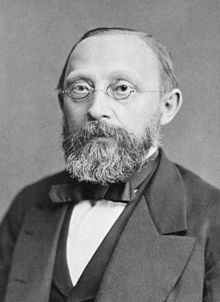
A name from my childhood, when for a period I was fascinated by the history of microbiology.
Virchow was born in 1821 and lived until 1902. He was involved in anthropology, politics, etc. but is best known for his contributions to medical research.
Virchow is considered the father of modern pathology. He applied cell theory, already then much discussed, to explain the effects of infection on organs and tissues of the human body.
The basic insight was that the causes of disease are to be found not at the tissue level, but at the cellular level. This led him to especially groundbreaking work in the area of cancer, where he was the first to hypothesize that cancerous cells were originally normal healthy cells, not invaders.
He also made great strides regarding thromboembolism, setting out the hypothesis that pulmonary thrombi are carried from the veins of the leg by the flow of blood, then doing the experiments that proved this point.
Unfortunately, where there is light there is shadow. Virchow moved medicine forward in some respects, but he impeded its progress in others. He rejected the theory that bacteria cause disease, and opposed Ignaz Semmelweiss' advocacy of antisepsis.
Comments
Post a Comment